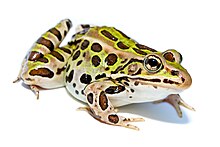豹蛙
外观
| 豹蛙 | |
|---|---|

| |
| 科学分类 | |
| 界: | 动物界 Animalia |
| 门: | 脊索动物门 Chordata |
| 纲: | 两栖纲 Amphibia |
| 目: | 无尾目 Anura |
| 科: | 蛙科 Ranidae |
| 属: | 蛙属 Rana |
| 种: | 豹蛙 R. pipiens
|
| 双名法 | |
| Rana pipiens Schreber, 1782
| |
| 异名 | |
| |
豹蛙(学名:Rana pipiens[2][3]),又名斑绿蛙、北美豹蛙、美洲豹蛙或草蛙,是原住于加拿大及美国的一种青蛙。
描述
[编辑]豹蛙的体型稍大,约长11厘米。牠们背部呈绿色至褐色,其背上、两侧及四肢有大及圆的黑点。每个黑点一般都有环围绕。由眼睛开始延伸至背部有一对背侧褶,这对背侧褶一般较为浅色或呈粉红色。由鼻孔、眼睛下至鼓膜有一条淡色的斑纹,一直延至肩膀。腹部呈白色或淡绿色。瞳孔呈金色,趾上有蹼。
豹蛙蝌蚪呈深褐色或灰色,下方有细小的疙瘩。尾巴呈淡黄褐色。
生态行为
[编辑]豹蛙可以栖息在广泛不同的地方。牠们会在池塘、沼泽及水流缓慢的河流出现。牠们一般会藏身在有丰富水中植物的地方。牠们适应了寒冷的气候,在海拔3000米处仍有牠们的踪迹。雄蛙会在春天及夏天发出像打鼾的声音。
豹蛙会于每年3月至6月春天时繁殖。每次会产达6500颗卵,蝌蚪会在产卵的池塘中完成变态,约需70-110天时间。变态后的豹蛙只有2-3厘米长。
豹蛙在加拿大西部曾甚为普遍,但于1970年代开始减少,相信是因如酸雨般的污染所造成。牠们的数量仍未能回复以往的水平。
豹蛙会被不同的动物所猎食,如蛇、浣熊、其他青蛙及人类。牠们的皮肤不会分泌味道差的体液,只依靠速度来避开猎食者。牠们会吃蚂蚁、甲虫、苍蝇、蠕虫及细小的青蛙。牠们甚至可以吞下鸟类及束带蛇。
研究
[编辑]医药
[编辑]豹蛙会在卵母细胞生产核糖核酸酶,可能作为治疗癌症。当中的豹蛙酶已用在临床治疗间皮瘤及肺部肿瘤。另外一种称为amphinase,最近指可以治疗脑部肿瘤。[4]
神经科学
[编辑]在1950年代前已利用豹蛙来协助发掘神经元的特性。豹蛙坐骨神经及缝匠肌的神经肌肉接点提供了很多有关神经系统的数据。[5][6][7][8][9][10]
参考
[编辑]- ^ Hammerson, G.; Solís, F.; Ibáñez, R.; Jaramillo, C.; Fuenmayor, Q. Lithobates pipiens. The IUCN Red List of Threatened Species. 2004, 2004: e.T58695A11814172. doi:10.2305/IUCN.UK.2004.RLTS.T58695A11814172.en
 .
.
- ^ Hillis, D. M. Constraints in naming parts of the Tree of Life. Molecular Phylogenetics and Evolution. 2007, 42: 331–338.
- ^ Hillis, D. M., and T. P. Wilcox. Phylogeny of the New World True Frigs (Rana). Molecular Phylogenetics and Evolution. 2005, 34: 299–314.
- ^ Andrew McLaughlin. Frog molecule could provide drug treatment for brain tumors. 2007-06-26 [2008-10-24]. (原始内容存档于2020-11-11).
- ^ Fatt & Katz. Spontaneous subthreshold activity at motor nerve endings. J Physiol. 1952, 117: 109–128.
- ^ Del Castillo & Katz. Quantal components of the end-plate potential. J Physiol. 1954a, 124: 560–573.
- ^ Katz & Miledi. The measurement of synaptic delay, and the time course of acetylcholine release at the neuromuscular junction. Proc. R. Soc. B. 1965, 161: 483–495.
- ^ Kuffler & Yoshikama. The number of transmitter molecules in a quantum: an estimate from iontophoretic application of acetylcholine at the neuromuscular synapse. J. Physiol. 1975, 251: 465–482.
- ^ Hille. The seelctive inhibition of delayed potassium currents in nerve by tetraethylammonium ion. J. Gen Physiol. 1967, 50: 1287–1302.
- ^ CR Anderson, CF Stevens. Voltage clamp analysis of acetylcholine produced end-plate current fluctuations at frog neuromuscular junction. J.Physiol: 655–691.

